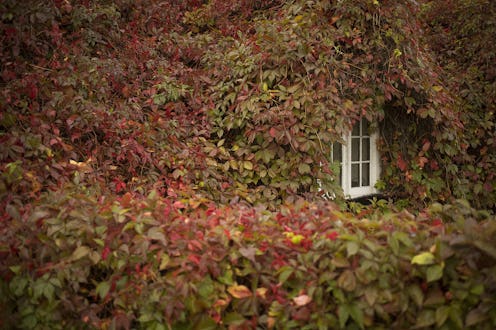Life
6 Ways Fall Asthma Is Different From Spring Asthma, According To A Doctor

As summer changes into fall, it's the time for pumpkins, snuggly scarves and warm sweaters, but for those of us who have asthma, fall means it's also a period for inhalers and lung irritation.
"The third week of September has been labeled asthma peak week," allergist and immunologist Dr. Purvi Parikh of the Allergy & Asthma Network tells Bustle, and while we may think of spring as the peak time for allergies and irritated airways, fall actually has the edge as the more serious season for people prone to asthma.
Asthma is a condition that involves chronic irritation of the airway passages in the lungs, and people who have it will have extremely sensitive cells inside their breathing passages that react poorly to airborne irritants and diseases. The American College of Allergy, Asthma and Immunology notes that asthma, which is experienced by around 26 million Americans, can be triggered by everything from pollens to wood smoke and strong odors, though triggers can be individual and evolve over time. If you're nearing peak asthma week with a feeling of severe trepidation, here's a good explainer as to how spring and fall asthma differs — and why fall asthma can be worse. Here are six ways fall and spring asthma are different.
1The Symptoms Are The Same
"Fall asthma is very similar to spring asthma," Dr. Parikh tells Bustle, "in the sense that the symptoms are the same." An asthma attack looks the same regardless of season, as do other symptoms; Dr. Parikh says there are many, including coughing, wheezing, chest tightness and shortness of breath, that characterize asthmatic irritation in both spring and fall.
2But The Triggers Are Different
While fall allergies and asthma, Dr. Parikh explains, are "triggered by a surge of pollen in the air like the spring," the pollen responsible for irritating asthmatics in fall comes from a different place. "This time the culprit is ragweed pollen, which is different than tree pollen in spring," Dr. Parikh says. The difference means that allergic reactions can be greater or lesser depending on the season, and also depends on the severity of the pollen count in individual areas across the country.
3Changing Seasons Are An Issue
Dr. Parikh notes that seasonal changes can be a trigger for asthmatic signals in autumnal weather, particular because the season is getting colder. Cold weather is known to create contractions in the lung tissue of asthmatics, according to Health, leading to more asthma attacks, but shifts of any kind in humidity or temperature in the wider environment are likely to irritate the airways and cause asthmatic symptoms.
4Viruses Can Influence Fall Asthma
"One aspect that makes fall asthma worse is the fact that many viruses are in the air, such as cold and flu," says Dr. Parikh. The beginning of flu season increases the risk of asthma attacks; the Center for Disease Control and Prevention explains that asthmatics are more vulnerable to complications and attacks when they have flu because of their sensitive lung tissues, though they're not more likely to get it in the first place.
5The Weather Matters
Severe weather events in fall and the lead-up to winter can increase the possibility of asthma attacks in fall. "Increased hurricanes and rain can be a trigger for many," explains Dr. Parikh. Anything that means a rise in natural pollen or dirt levels in the air because of wind or hard rain on loose surfaces can trigger asthma attacks. However, as wildfires increase during summer due to climate change creating greater fire risk, summer months may see an uptick in smoke-induced asthma attacks, too.
6
Fall's various asthma-exacerbating factors mean the season is indeed the peak of the year for asthma symptoms. Knowing your asthma triggers can help you stay safe during this season and all year long.